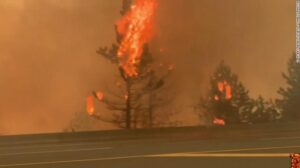Out-of-control wildfires and record temperatures in British Columbia

TORONTO – Never felt before temperatures, out-of-control fires, evacuations, panic and fear: It’s been a very difficult week in large parts of British Columbia. The data, naked and raw, are able to explain by thread and by sign the severity of the situation, which is still a long way from normal. At least 719 people have been killed in the heatwave that hit the province overlooking the Pacific Ocean, according to the coroner. Deaths – confirmed the authorities – caused by record temperatures recorded in many locations in British Columbia: the mercury column has exceeded 45 degrees centigrade abundantly. It remains to be seen whether the budget presented in the last few days is the final one or whether the B.C. authorities will be forced to revise the numbers again this week.
There is also a clear correlation between record heat and the fire situation. According to the provincial government, at least 177 fires are considered out of control in wooded areas throughout the territory. In the last twenty-four hours alone, another 70 fires have been disrenered. The flames that are devouring forests and threatening many urban centers and many Indian reserves have forced the authorities to order the evacuation of some towns.
The most serious situation in recent days has occurred in Lytton, coincidentally the city where last week was recorded the highest temperature ever recorded in Canada, 49.1 degrees centigrade. Lytton was completely evacuated and the out-of-control flames devoured and razed much of the town.
According to the latest statement from the authorities, there are two confirmed victims in Lytton, while the identification procedures for all the people who have escaped quickly from the town and who have reached the evacuation centres set up by the provincial authorities in four cities are continuing: in Castlegar, Chilliwack, Kelowna and Merritt.
In Lytton, after the general evacuation, the flames were extinguished with great difficulty and the emergency services were not able to enter the town until Saturday afternoon. The devastation is reminiscent of the great fire of 2016 that razed entire neighborhoods of Fort McMurray, Alberta.
Meanwhile, experts are trying to analyse what has happened in these areas over the past week. It is clear that the scorching heat that lasted several days facilitated the development of fires in much of the province, a phenomenon that had already been at the root of the Fort McMurray tragedy.
Natalie Hasell, a meteorologist and climate change expert, made no secret of her concern during an interview with CTV. “The fact that this has happened, and the suggestion that it could happen more – with the same intensity or greater intensity than what we have seen in the past, a longer duration than what we’ve seen in the past, that does fit with what we can expect from climate change.” “Global warming – we have evidence for that, it’s real,” she continued. “Unfortunately we are living it already – it’s not the future, it’s here…so I hope people take the time to get better prepared as we will likely be seeing this more often.”
Very worrying words, in short, in line with the thesis of numerous climate change experts who in the recent past had sounded the alarm: over time, they are bound to increase the risks as well.


